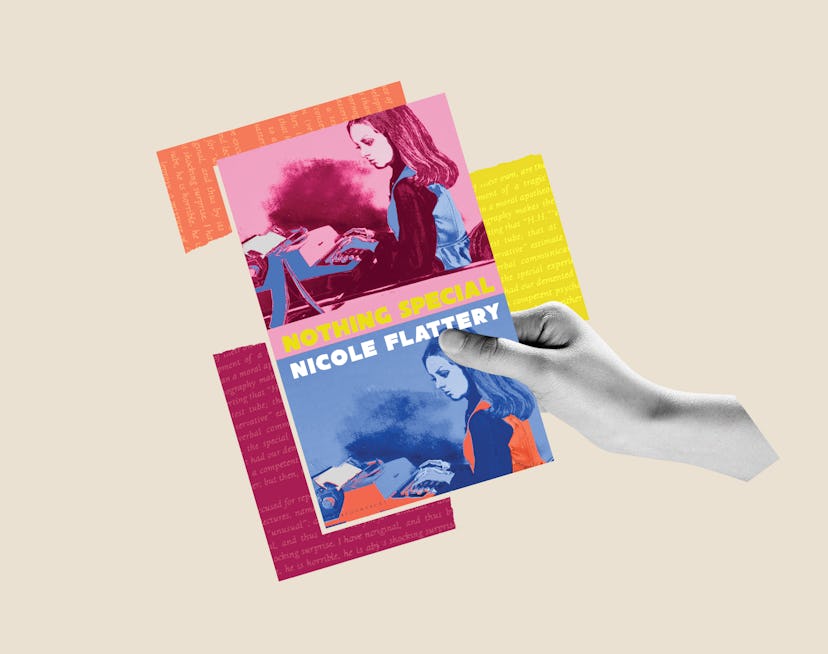Bustle Book Club
Nicole Flattery Is Reimagining Andy Warhol’s World
Nothing Special spotlights the women behind the typewriters.

Nicole Flattery has always held a particular fascination with tape recordings, so it makes sense that they are at the centre of her debut novel, Nothing Special. Author of the short story collection Show Them A Good Time and winner of awards such as The White Review Short Story Prize, Flattery brings to life Andy Warhol’s 1960s New York City in a reimagining of the women working behind the scenes in his studio, in a way that Sally Rooney aptly described as “bold, irreverent, and agonisingly funny.” Nothing Special follows 17-year-old high school dropout Mae as she’s hired as a typist for Warhol, alongside several other women, who’s putting together a novel based on recordings of his famous friends. Mae finds herself befriending one of the typists, Shelley, and the pair embark on a journey of finding themselves and how they fit into this world, but as Mae becomes increasingly obsessed with the tapes, she grows more numb to her own reality.
“I always find myself coming back to this particular era, probably because I studied film in college, and the ‘60s and ‘70s was such an interesting time for film,” Flattery tells me over Zoom from her Dublin home. “But I was inspired for this particular idea about Warhol from Olivia Laing’s Lonely City where his novel is mentioned and I wanted to know more.” Warhol’s novel, titled a: a novel, is in fact real and was published in 1968, made up of transcripts of conversations that happened at his studio, The Factory.
But Flattery didn’t want to write a book about Warhol, but the complex lives of the women in the background making his book possible. He’s only mentioned a couple of times in Nothing Special. “He hired people like Mae and Shelley because of their unstable backgrounds and because needed that kind of energy from them. I wanted to explore that power dynamic and focus on their thoughts and experiences instead,” she explains.
Below, Flattery reflects on celebrity culture, writing during lockdown, and her fascination with the internet.
On “celebrity”:
“I find the concept of a celebrity, and the construction that goes into a celebrity’s brand or image, quite fascinating. All the people working behind the scenes to build this particular image and how that’s evolved over the years, especially with the rise of the digital world. As a society, we tend to make icons of people, which is what I wanted to convey through Mae in Nothing Special. But with celebrities or famous figures, like Warhol, there was a distance between us and them. An air of mystique around them that was separate from their public image.
“But now, celebrities feel closer than ever before because we want to know them, but there’s also this push and pull effect because we also want to believe in the fantasy and mystery of them too. I think that’s why there’s such an appetite recently for biopics, like Elvis and Bohemian Rhapsody, because we want to peer into the world of these icons. The construction of the celebrity has meant we feel as though we know musicians, movie stars, artists, etc and form these para-social relationships with them, but all we actually know is what they’ve presented us with.”
On taking breaks from social media:
“I take a break every now and then from social media but I actually quit using Twitter for a while during lockdown and writing the book. And I genuinely didn’t think it would have a major effect on me or my mind but I was surprised with how much clarity and calmness I felt coming off it. I don’t think all that noise is good for anyone. But I do find the voyeurism and surveillance aspects of the internet particularly weird and interesting and it’s probably why it’s such a prominent theme in the book.”
On writing a book in a gallery:
“I wrote a lot of Nothing Special during lockdown so, like so many of us, I spent a lot of time at home in my apartment in Ireland. But as restrictions eased, I was lucky enough to get a writer-in-residence job at Temple Bar Gallery and they gave me an office, which was a lifesaver. It was such a brilliant environment, and to have my own space dedicated just for writing was exactly what I needed. I honestly don’t think I could’ve finished the book without it.”
On finding her voice:
“When I first started writing, I felt there was a certain way that stories were supposed to be read and written, and it took me a long time to write past that. I thought literature had to be serious (especially as a woman) so you would be taken seriously, if you’re funny and you enjoy reading humour or you love romance then you couldn’t possibly put that in your writing. But it’s just prohibitive to creativity. Finding your own voice in your writing and trusting your own instincts can be nerve-wracking and take a while — I definitely spent several years in my 20s feeling this way — but that’s where the good stuff is. And even if it takes a while, you’ll likely arrive at something more interesting than you expected.”
This interview has been edited and condensed for clarity.